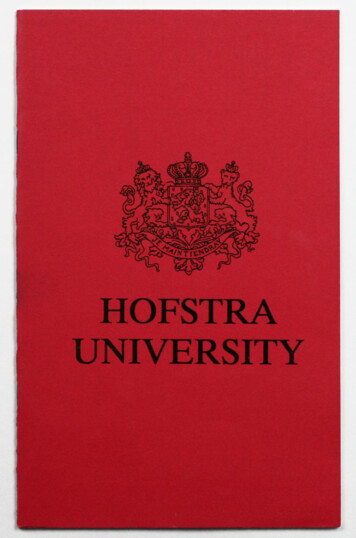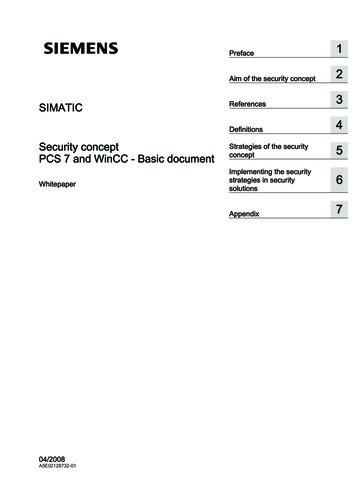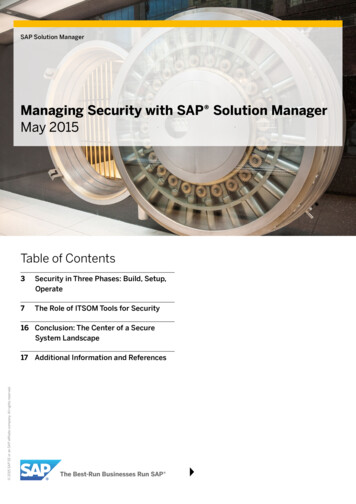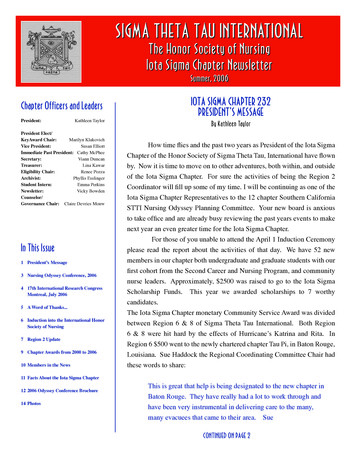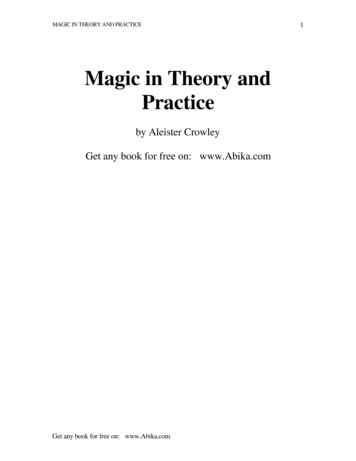
Transcription
Review of International Studies (1997), 23, 5–26Copyright British International Studies AssociationThe concept of security*DAV I D A . B A L D W I NRedefining ‘security’ has recently become something of a cottage industry.1 Mostsuch efforts, however, are more concerned with redefining the policy agendas ofnation-states than with the concept of security itself. Often, this takes the form ofproposals for giving high priority to such issues as human rights, economics, theenvironment, drug traffic, epidemics, crime, or social injustice, in addition to thetraditional concern with security from external military threats. Such proposals areusually buttressed with a mixture of normative arguments about which values ofwhich people or groups of people should be protected, and empirical arguments asto the nature and magnitude of threats to those values. Relatively little attention isdevoted to conceptual issues as such. This article seeks to disentangle the concept ofsecurity from these normative and empirical concerns, however legitimate theymay be.Cloaking normative and empirical debate in conceptual rhetoric exaggerates theconceptual differences between proponents of various security policies and impedesscholarly communication. Are proponents of economic or environmental securityusing a concept of security that is fundamentally different from that used byRealists? Or are they simply emphasizing different aspects of a shared concept? Dothose who object to ‘privileging’ the nation-state rather than, say, the individual orhumanity share any conceptual views with students of ‘national security’? Thisarticle attempts to identify common conceptual distinctions underlying variousconceptions of security.Identifying the common elements in various conceptions of security is useful in atleast three ways: First, it facilitates asking the most basic question of social science,* The author would like to thank the following scholars for helpful comments on previous versions ofthis article: Richard Betts, Lea Brilmayer, Robert Jervis, Helen Milner, Jack Snyder, and HendrikSpruyt.1E.g. Lester Brown, Redefining National Security, Worldwatch Paper No. 14 (Washington, DC, 1977);Jessica Tuchman Matthews, ‘Redefining Security’, Foreign Affairs, 68 (1989), pp. 162–77; Richard H.Ullman, ‘Redefining Security’, International Security, 8 (1983), pp. 129–53; Joseph J. Romm, DefiningNational Security (New York, 1993); J. Ann Tickner, ‘Re-visioning Security’, in Ken Booth and SteveSmith (eds.), International Relations Theory Today (Oxford, 1995), pp. 175–97; Ken Booth, ‘Securityand Emancipation’, Review of International Studies, 17 (1991), pp. 313–26; Martin Shaw, ‘There Is NoSuch Thing as Society: Beyond Individualism and Statism in International Security Studies’, Reviewof International Studies, 19 (1993), pp. 159–75; John Peterson and Hugh Ward, ‘CoalitionalInstability and the New Multidimensional Politics of Security: A Rational Choice Argument forUS–EU Cooperation’, European Journal of International Relations, 1 (1995), pp. 131–56; ten articleson security and security studies in Arms Control, 13, (1992), pp. 463–544; and Graham Allison andGregory F. Treverton (eds.), Rethinking America’s Security: Beyond Cold War to New World Order(New York, 1992).5
6David A. Baldwin‘Of what is this an instance?’.2 Second, it promotes rational policy analysis byfacilitating comparison of one type of security policy with another. And third, itfacilitates scholarly communication by establishing common ground between thosewith disparate views. Perhaps scholars from different schools have more in commonthan is generally acknowledged.3In many ways the argument presented here was foreshadowed in the classic essayby Arnold Wolfers entitled ‘ ‘‘National Security’’ as an Ambiguous Symbol’, published more than forty years ago. Contrary to popular belief, Wolfers did not dismissthe concept as meaningless or hopelessly ambiguous. He was, however, concernedabout the ambiguity of ‘national security’, as the following passage indicates:It would be an exaggeration to claim that the symbol of national security is nothing but astimulus to semantic confusion, though closer analysis will show that if used withoutspecifications it leaves room for more confusion than sound political counsel or scientificusage can afford.4Wolfers’ ‘specifications’ refer not only to the concept of national security as a policyobjective but also to the means for its pursuit, i.e., national security policy. In thediscussion that follows, Wolfers’ specifications will be developed and set in thecontext of more recent literature.The discussion consists of seven parts. Sections 1, 2 and 3 provide backgroundwith respect to the approach to conceptual analysis to be used, the neglect of conceptual analysis by the field of security studies, and the possibility that conceptualanalysis is futile with respect to concepts like security that are alleged to be‘essentially contested’. Section 4 develops a series of conceptual specifications thatfacilitate analysis of security policy. Sections 5, 6 and 7 discuss the implications ofthese specifications for determining the value of security, for the theory ofneorealism, and for the ‘new thinking’ about security.Although this discussion is especially concerned with the security of nation-states,most of the analysis is applicable, mutatis mutandis, to any level: individual, family,society, state, international system, or humanity.1. Conceptual analysis5Conceptual analysis is not concerned with testing hypotheses or constructingtheories, though it is relevant to both. It is concerned with clarifying the meaning ofconcepts. Some would dismiss such undertakings as ‘mere semantics’ or ‘purelogomachy’. Without clear concepts, however, scholars are apt to talk past eachother, and policy-makers find it difficult to distinguish between alternative policies.Felix E. Oppenheim has argued that ‘the elucidation of the language of political2345I thank James Rosenau for this phrase.See Kjell Goldmann, ‘Im Westen Nichts Neues: Seven International Relations Journals in 1972 and1992’, European Journal of International Relations, 1 (1995), pp. 245–58.Arnold Wolfers, ‘ ‘‘National Security’’ as an Ambiguous Symbol’, Political Science Quarterly, 67(1952), p. 483.This section draws on the discussion in David A. Baldwin, Paradoxes of Power (Oxford, 1989),pp. 170–2.
Concept of security7science is by no means an idle exercise in semantics, but in many instances a mosteffective way to solve substantive problems of research’.6Conceptual explication attempts to specify the logical structure of given expressions: Takingits departure from the customary meanings of the terms, explication aims at reducing thelimitations, ambiguities, and inconsistencies of their ordinary usage by propounding areinterpretation intended to enhance the clarity and precision of their meanings as well astheir ability to function in hypotheses and theories with explanatory and predictive force.7The explication of concepts is subject to a set of criteria summarized byOppenheim: (1) Concepts should be operational in the broadest sense, although thisshould not be interpreted as requiring quantification. (2) Concepts that establishdefinitional connections with other terms are to be preferred. (3) Concepts that drawattention to the theoretically important aspects of the subject matter that mighteasily be overlooked are desirable. (4) Concepts should not preclude empiricalinvestigation by making true ‘by definition’ what should be open to empiricalinquiry. (5) Concepts should remain reasonably close to ordinary language.‘Ordinary language’, however, does not necessarily mean the way most people woulddefine the term, but rather the ‘set of rules they implicitly follow when applying it toa given situation’.8It is important to be clear about the limits of this approach. Explicating theconcept of security does not provide empirical propositions, theories, or analyticalframeworks. Although clear concepts are useful for constructing propositions.theories, and analytical frameworks, they are not a substitute for them.This approach may be contrasted with those taken by Barry Buzan and RichardUllman. Although Buzan casts his discussion as an exploration of the concept ofsecurity, his analysis intertwines conceptual analysis with empirical observations. Forexample, Buzan presents plausible arguments for the empirical proposition thatsecurity at the individual level is related to security at the level of the state and theinternational system. His insistence that ‘security cannot be isolated for treatment atany single level’, however, gives the impression that this is conceptually impossiblerather than simply an unwise research strategy. His justification for mixing conceptual and empirical analysis is that ‘the search for a referent object of securitygoes hand-in-hand with that for its necessary conditions’.9 This approach, however,6789Felix E. Oppenheim, ‘The Language of Political Inquiry: Problems of Clarification’, in Fred I.Greenstein and Nelson W. Polsby (eds.), Handbook of Political Science, Vol. I: Political Science: Scopeand Theory (Reading, MA, 1975), p. 284.Carl G. Hempel, Fundamentals of Concept Formation in Empirical Science (Chicago, 1952), p. 12.Oppenheim, ‘Language’, pp. 297–309. See also Felix E. Oppenheim, Political Concepts: AReconstruction (Chicago, 1981). For criticisms of this approach, see William E. Connolly, The Termsof Political Discourse, 2nd edn (Princeton, 1983), and Richard E. Little, ‘Ideology and Change’, inBarry Buzan and R. J. Barry Jones (eds.), Change and the Study of International Relations: the EvadedDimension (New York, 1981), pp. 30–45.Regardless of whether one accepts the criteria suggested here, it is necessary to identify somecriteria for conceptual analysis. Barry Buzan’s contention that security is ‘weakly conceptualized’ and‘underdeveloped’ would be more telling if he were to identify criteria for distinguishing between weakand strong conceptualizations or between underdeveloped and fully developed concepts. BarryBuzan, People, States and Fear: An Agenda for International Security Studies in the Post-Cold WarEra, 2nd edn (Boulder, CO, 1991), pp. 3–5.Buzan, People, States, pp. 20–1, 26. Italics added. See also, Barry Buzan, ‘Peace, Power and Security:Contending Concepts in the Study of International Relations’, Journal of Peace Research, 21 (1984),pp. 109–25.
8David A. Baldwinrisks conflating conceptual analysis with empirical observation. Understanding theconcept of security is a fundamentally different kind of intellectual exercise fromspecifying the conditions under which security may be attained. Indeed, conceptualclarification logically precedes the search for the necessary conditions of security,because the identification of such conditions presupposes a concept of security.10This failure to recognize the logical priority of conceptualization is also reflectedin Ullman’s observation that ‘one way of moving toward a more comprehensivedefinition of security’ is to ask what one would be ‘willing to give up in order toobtain more security’. Such a question, however, has little meaning until one first hasa concept of security. Likewise, his statement that ‘we may not realize what it [i.e.security] is . . . until we are threatened with losing it’11 is difficult to comprehend. Ifone has no concept of security, one cannot know whether one is threatened withlosing it or not. Inquiry into the opportunity costs of security is an excellent way todetermine the value of security, but it is no help at all in determining what security is.2. Security as a neglected conceptIt would be an exaggeration to say that conceptual analysis of security began andended with Wolfers’ article in 1952—but not much of one. The neglect of security asa concept is reflected in various surveys of security affairs as an academic field. In1965 one such study lamented that ‘thus far there have been very few attempts . . . todefine the concept of national security’.12 In 1973 Klaus Knorr began a survey ofthe field by stating his intention to ‘deliberately bypass the semantic and definitionalproblems generated by the term ‘‘National Security’’ ’.13 In 1975, Richard Smokeobserved that the field had ‘paid quite inadequate attention to the range ofmeanings of ‘‘security’’ ’.14 In 1991, Buzan described security as ‘an underdevelopedconcept’ and noted the lack of ‘conceptual literature on security’ prior to the1980s.15 Although Buzan sees some progress in the 1980s, there are still indicators ofneglect. Two recent surveys of security studies, for example, did not bother to definesecurity.16 And none of the eleven course syllabi described in Security Studies for the1990s includes Wolfers’ seminal article on the concept of national security.171011121314151617‘The elaboration of hypotheses presupposes, logically, a conceptual framework in terms of whichclear hypotheses may be formulated’. Harold D. Lasswell and Abraham Kaplan, Power and Society:A Framework for Political Inquiry (New Haven, CT, 1950), p. x.Ullman, ‘Redefining Security’, pp. 130, 133.P. G. Bock and Morton Berkowitz, ‘The Emerging Field of National Security’, World Politics, 19(1966), p. 124.Klaus Knorr, ‘National Security Studies: Scope and Structure of the Field’, in Frank N. Trager andPhilip S. Kronenberg (eds.), National Security and American Society: Theory, Process and Policy(Lawrence, KS, 1973), p. 5.Richard Smoke, ‘National Security Affairs’, in Fred I. Greenstein and Nelson W. Polsby (eds.),Handbook of Political Science, Vol. 8: International Politics (Reading, MA, 1975), p. 259.Buzan, People, States, pp. 3–4.Stephen M. Walt, ‘The Renaissance of Security Studies’, International Studies Quarterly, 35 (1991),pp. 211–39; and Joseph S. Nye, Jr and Sean M. Lynn-Jones, ‘International Security Studies: A Reportof a Conference on the State of the Field’, International Security, 12 (1988), pp. 5–27.Richard Schultz, Roy Godson, and Ted Greenwood (eds.), Security Studies for the 1990s (New York,1993). A recent forum on security in Arms Control, 13 (1992), including ten authors, never mentionsWolfers’ article.
Concept of security9Considering the plethora of attempts to ‘redefine’ security since the end of theCold War18, one might question whether security should be described as a neglectedconcept. Two reasons for doing so are compelling. First, security is an importantconcept, which has been used to justify suspending civil liberties, making war, andmassively reallocating resources during the last fifty years. Despite the flurry ofrecent works, it seems fair to describe security as a concept that received far lessscholarly attention than it deserved during that period. And second, most recentworks on security would not qualify as conceptual analysis in the sense described inthe previous section. Security has not received the serious attention accorded to theconcepts of justice, freedom, equality, obligation, representation, and power.19Buzan suggests five possible explanations for the neglect of security.20 First, is thedifficulty of the concept. As Buzan admits, however, this concept is no more difficultthan other concepts. Second, is the apparent overlap between the concepts ofsecurity and power. Since these are easily distinguishable concepts, however, onewould have expected such confusion to motivate scholars to clarify the differences.Third, is the lack of interest in security by various critics of Realism. This, however,does not explain why security specialists themselves neglected the concept. Fourth, isthat security scholars are too busy keeping up with new developments in technologyand policy. This, however, is more an indication that such scholars give low priorityto conceptual issues than an explanation for this lack of interest. And the fifthexplanation considered by Buzan is that policy-makers find the ambiguity of‘national security’ useful, which does not explain why scholars have neglected theconcept.21 On balance, none of Buzan’s explanations is very convincing.Paradoxical as it may seem, security has not been an important analytical conceptfor most security studies scholars. During the Cold War, security studies was composed mostly of scholars interested in military statecraft. If military force wasrelevant to an issue, it was considered a security issue; and if military force was notrelevant, that issue was consigned to the category of low politics. Security has been abanner to be flown, a label to be applied, but not a concept to be used by mostsecurity studies specialists. Buzan’s puzzlement as to how a central conceptlike security could be so ignored disappears with the realization that military force,not security, has been the central concern of security studies.221819202122For an overview of these attempts, see Tickner, ‘Re-visioning Security’; and Emma Rothschild, ‘Whatis Security?’, Daedalus, 124 (1995), pp. 53–98. See also references in n. 1 above.Peter Digeser, ‘The Concept of Security’, paper delivered at the 1994 Annual Meeting of theAmerican Political Science Association, 14 September 1994. Unlike most recent works on security,this paper seriously engages conceptual issues.Buzan, People, States, pp. 7–11.The only instance that has come to my attention of a scholar suggesting that the ambiguity ofsecurity might be an asset is Buzan, ‘Peace, Power’, p. 111.I have found few security specialists willing to defend the label ‘security studies’. The characteristicresponse may be paraphrased as follows: ‘This is merely a semantic issue. Personally, I don’t carewhether the field is called security studies, military studies, or war studies. Security studies, however, iswidely used; and it seems to make the subject more acceptable in academia’. If security were reallythe central focus of the field, one would expect a more vigorous defence of the label.
10David A. Baldwin3. Security as a contested conceptSome scholars have depicted security as an ‘essentially contested concept’.23 Thiscontention must be addressed before we proceed to analyse the concept of security,for three reasons: First, there is some ambiguity as to what this means. Second,security may not fulfil the requirements for classification as an ‘essentially contestedconcept’. And third, even if security were to be so classified, the implications forsecurity studies may be incorrectly specified.24Essentially contested concepts are said to be so value-laden that no amount ofargument or evidence can ever lead to agreement on a single version as the ‘corrector standard use’.25 The stronger variants of this position lead to a radical scepticalnihilism in which there are no grounds for preferring one conception of security toanother.26 Acceptance of this position would make the kind of conceptual analysisundertaken here futile. There are, however, weaker forms of this position that allowone to differentiate between better and worse conceptualizations, even though ultimately none of the better conceptualizations can ever be said to be the best.27 Sincethe analysis undertaken here purports only to improve on current usage, and not toidentify the single best usage, it is compatible with the weaker variant of the essential contestedness hypothesis.It is not clear, however, that security should be classified as an essentiallycontested concept. Of the several requirements for such a classification, two areespecially questionable with respect to the concept of security. In the first place, theconcept must be ‘appraisive in the sense that it signifies or accredits some kind ofvalued achievement’.28 W. B. Gallie uses the concept of a ‘champion’ in sports toillustrate the point, i.e., to label a team as champion is to say that it plays the gamebetter than other teams. Is the concept of security similar to the concept of achampion? Neorealists seem to imply that it is. For them security is the mostimportant goal a state can have in the same way that winning a championship ispresumably the goal of all teams in Gallie’s example. Just as teams compete to bechampions, so states compete for security. And just as the champion is better atplaying the game than other teams, so states with more security than other states are232425262728Buzan, People, States, and ‘Peace, Power’; and Little, ‘Ideology and Change’. For the originalformulation, see W. B. Gallie, ‘Essentially Contested Concepts’, Proceedings of the AristotelianSociety, N.S., 56 (1956), pp. 167–98.It should also be noted that the concept of an ‘essentially contested concept’ has itself beencontested. For references, see Christine Swanton, ‘On the ‘‘Essential Contestedness’’ of PoliticalConcepts’, Ethics, 95 (1985), pp. 811–27; Alasdair MacIntyre, ‘The Essential Contestability of SomeSocial Concepts’, Ethics, 84 (1973), pp. 1–9; John N. Gray, ‘On the Contestability of Social andPolitical Concepts’, Political Theory, 5 (1977), pp. 330–48; and Oppenheim, Political Concepts,pp. 182–5.Gallie, ‘Essentially Contested Concepts’, p. 168.Gray, ‘On the Contestability’, p. 343; Swanton, ‘On the ‘‘Essential Contestedness’’ ’, pp. 813–14.Swanton, ‘On the ‘‘Essential Contestedness’’ ’, pp. 813–14.Gallie, ‘Essentially Contested Concepts’, p. 171. Not all value judgments are appraisive. Appraisalpresupposes an accepted set of criteria. Examples suggested by Oppenheim include ‘grading apples orstudent papers, evaluating paintings in terms of their market value, [and] wine tasting’. PoliticalConcepts, pp. 170–6.
Concept of security11better at playing the neorealist version of the ‘game’ of international politics.29 Fromthe neorealist perspective, then, it is plausible to treat security as an appraisiveconcept.Wolfers, however, presents a different view of security. He contends that statesvary widely in the value they place on security and that some states may be sodissatisfied with the status quo that they are more interested in acquiring new valuesthan in securing the values they have.30 From this perspective, saying that one statehas more security than another does not imply that one state is better than anotherany more than saying that one state has more people or land area implies that onestate is better than another. For Wolfers international politics is not a ‘game’ inwhich all states play by the same ‘rules’ and compete for the same ‘championship’.Is security an appraisive concept? For neorealists, it may be. For others, such asWolfers, it is not. The purpose of this discussion is not to settle the issue, but only topoint out that this question is more difficult to answer than those who classifysecurity as an essentially contested concept imply.A second requirement for classifying a concept as essentially contested—indeed,the defining characteristic of such concepts—is that it must actually generatevigorous disputes as to the nature of the concept and its applicability to variouscases. Gallie deliberately rules out policy disputes in ‘practical life’ that reflect conflicts of ‘interests, tastes, or attitudes’. These, he suggests, are more likely to involvespecial pleading and rationalization than deep-seated philosophical disagreement.31Thus, much of the contemporary public policy debate over whether to treat theenvironment, budget deficits, crime or drug traffic as national security issues doesnot qualify as serious conceptual debate by Gallie’s standards. For Gallie essentialcontestedness implies more than that different parties use different versions of aconcept. Each party must recognize the contested nature of the concept it uses, andeach must engage in vigorous debate in defence of its particular conceptual viewpoint.32 Yet the security studies literature, as the previous section pointed out, isvirtually bereft of serious conceptual debate. The neorealists may have a differentconception of security than Wolfers, but they do not debate his position; they ignoreit.33 Writers often fail to offer any definition of security. And if one is offered, it israrely accompanied by a discussion of reasons for preferring one definition ratherthan others. This is hardly the kind of toe-to-toe conceptual combat envisioned byGallie with respect to such matters as what constitutes justice, democracy, or a goodChristian.2930313233Cf. Kenneth N. Waltz, Theory of International Politics (Reading, MA, 1979), and ‘The EmergingStructure of International Politics’, International Security, 18 (1993), pp. 44–79; and John J.Mearsheimer, ‘Disorder Restored’, in Graham Allison and Gregory F. Treverton (eds.), RethinkingAmerica’s Security (New York, 1992), pp. 213–37.Wolfers, ‘National Security’, p. 491–2.Gallie, ‘Essentially Contested Concepts’, p. 169.Ibid., p. 172.In Waltz’s Theory, for example, security is posited as the principal goal of states; but little attention isgiven to defining it or defending the definition against other conceptions of security. Wolfers is nevercited. What Tickner (‘Re-visioning Security’, p. 177) describes as ‘a fully fledged debate about themeaning of security’ beginning in the 1980s is better characterized as a series of attacks on Realismand neorealism. A debate implies that there are two sides. With the possible exception of Buzan, noexample of a Realist or neorealist engaging critics in serious conceptual debate has come to thisauthor’s attention. And Buzan cannot fairly be described as a defender of traditional Realist orneorealist conceptions of security.
12David A. BaldwinEven if security were to be classified as an essentially contested concept, some ofthe implications suggested by Buzan are questionable. One cannot use the designation of security as an essentially contested concept as an excuse for notformulating one’s own conception of security as clearly and precisely as possible.Indeed, the whole idea of an essentially contested concept is that various partiespurport to have a clearer and more precise understanding of the concept thanothers. Yet Buzan explicitly disavows any intention of formulating a precise definition and suggests that to attempt to do so is to misunderstand the function ofessentially contested concepts in social science.34 ‘Such a conclusion’, as Ken Boothpoints out, ‘is unsatisfying. If we cannot name it, can we ever hope to achieve it?’35Another consequence Buzan attributes to the essential contestability of security isa set of ‘contradictions latent within the concept itself’.36 It is not entirely clear whatthis means, but such ‘contradictions’ seem to include those between the individualand the state, between national and international security, between violent meansand peaceful ends, between blacks and whites in South Africa, between the Jews andNazi Germany, and so on. Indeed, Buzan’s assertion that the ‘principal securitycontradiction’ for most states is between their own security and that of other statessuggests that the Cold War itself could be described as a ‘contradiction’ between thesecurity of the NATO allies and the Warsaw Pact countries.37 It is true, of course,that the state’s pursuit of security for itself may conflict with the individual’s pursuitof security; but this is an empirical fact rather than a conceptual problem. Most ofthe phenomena designated by Buzan as conceptual ‘contradictions’ could morefruitfully be called instances of empirically verifiable conflict between various actorsor policies.In sum, the alleged essential contestedness of the concept of security represents achallenge to the kind of conceptual analysis undertaken here only in its strongvariants. There are some grounds for questioning whether security ought to beclassified as an essentially contested concept at all. And even if it is so classified, theimplications may be misspecified. Insofar as the concept is actually contested thisdoes not seem to stem from ‘essential contestability’. Security is more appropriatelydescribed as a confused or inadequately explicated concept than as an essentiallycontested one.4. Specifying the security problematiqueNational security, as Wolfers suggested, can be a dangerously ambiguous concept ifused without specification. The purpose of this section is to identify somespecifications that would facilitate analysing the rationality of security policy. Thediscussion begins with specifications for defining security as a policy objective andproceeds to specifications for defining policies for pursuing that objective.34353637Buzan, People, States, pp. 16, 374; and ‘Peace, Power’, p. 125.Booth, ‘Security and Emancipation’, p. 317. On Buzan’s claim regarding the essential contestability ofsecurity, see also Digeser, ‘Concept of Security’.Buzan, People, States, pp. 1–2, 15, 364.Ibid., p. 364.
Concept of security13The point of departure is Wolfers’ characterization of security as ‘the absence ofthreats to acquired values’,38 which seems to capture the basic intuitive notionunderlying most uses of the term security. Since there is some ambiguity in thephrase ‘absence of threats’, Wolfers’ phraseology will be reformulated as ‘a lowprobability of damage to acquired values’. This does not significantly changeWolfers’ meaning, and it allows for inclusion of events such as earthquakes, whichUllman has argued should be considered ‘threats’ to security.39 The advantage ofthis reformulation can be illustrated as follows: In response to threats of militaryattack, states develop deterrence policies. Such policies are intended to providesecurity by lowering the probability that the attack will occur. In response to the‘threat’ of earthquakes, states adopt building codes. This does not affect theprobability of earthquakes, but it does lower the probability of damage to acquiredvalues. Thus the revised wording focuses on the preservation of acquired values andnot on the presence or absence of ‘threats’. With this reformulation, security in itsmost general sense can be defined in terms of two specificat
security] is . . . until we are threatened with losing it'11 is difficult to comprehend. If one has no concept of security, one cannot know whether one is threatened with losing it or not. Inquiry into the opportunity costs of security is an excellent way to determine the value of security, but it is no help at all in determining what .



